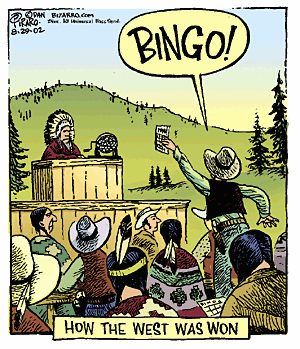
In the 12 November 2010 Glendale Republic, Scott Bungaard (R-Peoria) shills for the anti-casino crowd, largely on the back of arguments shot down in 2002 when voters passed Proposition 202, known as the “Indian Gaming Preservation and Self-Reliance Act” (IGPSRA). Ironically, Scotty argues that voters wanted just the opposite, claiming Prop 202 mostly sought to limit the number and location of tribal casinos in Arizona, that preserving a 10 year agreement which allowed local Native American tribes to manage Arizona based casinos was only a minor byproduct of the law.
Like most lies, there must be some bit of truth in order to promote the falsehood. In this case, quotas were indeed placed on tribal gambling devices, and casinos were limited to being hosted on tribal land. That’s it. Any additional interpretation, such as voter desire to keep casinos away from our communities, is pure fabrication. Bungaard’s tale is a revision of the political reality of 8 years ago.
Let’s examine the basis for Prop 202, as explained in Sec. 2 of the Amendment itself, entitled: “Declaration of Purpose”. In 7 small paragraphs, the history of Indian casinos is told. We learn that the roots of Tribal Gaming began in 1988 with a Federal pronouncement “confirming the right of Indian tribes to conduct limited, regulated gaming on their own land”. Consequently, “since 1992, Arizona statute has authorized the governor of the state to negotiate tribal-state compacts on the state’s behalf” as required by the Federal decision. Those brokered compacts were set to expire in 2003, and from the beginning of their enactment, were contested by Arizona racetrack interests – who claimed that special privilege granted Indian gaming, violated State law.
As stated in Proposition 202, “the Indian Gaming Preservation and Self-Reliance Act is designed to address this situation”, by amendment to Arizona Statutes, so that new compacts can survive legal challenges, seeking to gut these agreements. As stipulated, finite numbers and types of gaming devices, and fixed maximum numbers of gaming facilities were allotted per listed tribe, with the stated intent — regulating gambling influence throughout the state. A complicated method of calculating gambling device movement from location to location was specified. A thorough description of revenue shares resulting from gambling profits was carefully laid out, describing the economic benefits for social services of gaming entertainment. In regard to the physical location of Indian casinos, this proposition simply stated, that Indian managed gambling is permissible only on tribal owned land.
Recently, a shadow Internet effort under the name “Keep the Promise” (KEP) surfaced, whose proponents infer that the passage of Proposition 202 almost a decade ago, was intended to limit the proximity of Indian casinos to some far off land, or as they state “traditional land”, whatever that means. The word “traditional” cannot be found anywhere in Prop 202, and verbal amendments to Arizona Statute, based on assumed intent, are never allowed. More to the point, a look at current Maricopa county gaming locations will show that the newest existing casino facilities reside as near to urban areas as their boundaries will allow. KEP, under a sly pseudo-statement of “who they are”, disclose coyly that they are “Arizonans like you”. WTF?
Polls continue to back casino construction at the proposed Glendale location. People vote with their wallets, as the old saying goes, according to Jim Haynes, president of the Phoenix-based Behavior Research Center, which conducted the survey for the Tohono – O’odham Community. And those voting citizens favor the commercial interest generated, and the entertainment value created by an urban west side casino.
Scotty just won’t stop spinning a hidden meaning of State Statute as defined under Prop 202, and trots out previously tried and rejected ethical arguments once used as counterpoints against the passage of the IGPSRA. Crime, bankruptcies and anti-family spirit were the arguments put forth by “The Center for Arizona Policy“, a non-profit closely associated with Focus on the Family – itself a stalwart conservative religious organization focused on shaping behavior according to their thinly viewed religious viewpoint. Voters shrugged and said yes to Prop 202. Linda Rawles of Mesa spoke about a fear of “sovereign immunity” in a published argument against IGPSRA, yet voters passed 202. Jon Kyl, Jeff Flake and John Shadegg, all Arizona politicos, voiced opposition to 202 on the basis of “social, cultural and law enforcement problems being exported to the state for processing”. Some might suggest racetrack interests purchased their intervention. Voters ignored these influences and passed 202.
So are Bungaard’s arguments, the will of the people, or rather Orwellian doublespeak?
These objectors are stretching something all right. The very intent of reservations was to isolate Native Americans. Until ore or other treasures were found on their land, at which time they were allowed into a dialogue of ‘We’ll take what you thought we had given you that you thought you owned that we didn’t think was worth anything at the time’…etc. Ergo, isn’t the proposed casino to be built on land that the tribe purchases, therefore legal “as of right”? Shades of Scottsdale with The Pavilions.
Mariano,
You shed light on revisionist rantings. Damn the wording, it is the presumption which is important. Where the intent is to isolate a people; legislation will conform to this standard. Hence, Indian gaming must benefit the conquering people, while maintaining the pariah status of the vanquished native Americans.
Ones interpretation depends upon a (narrow-minded) point of view.